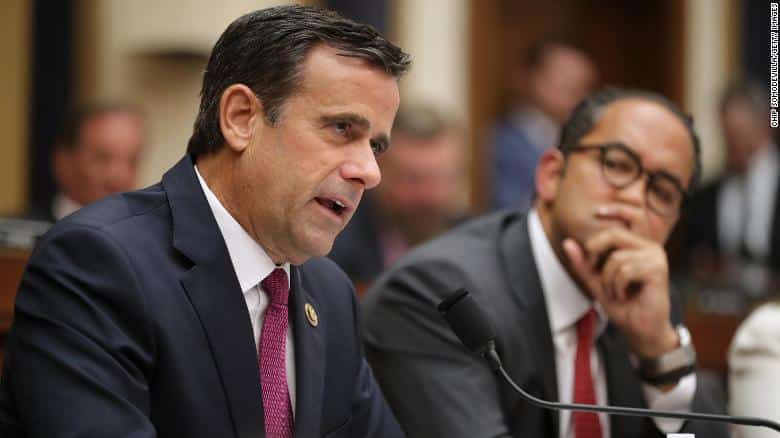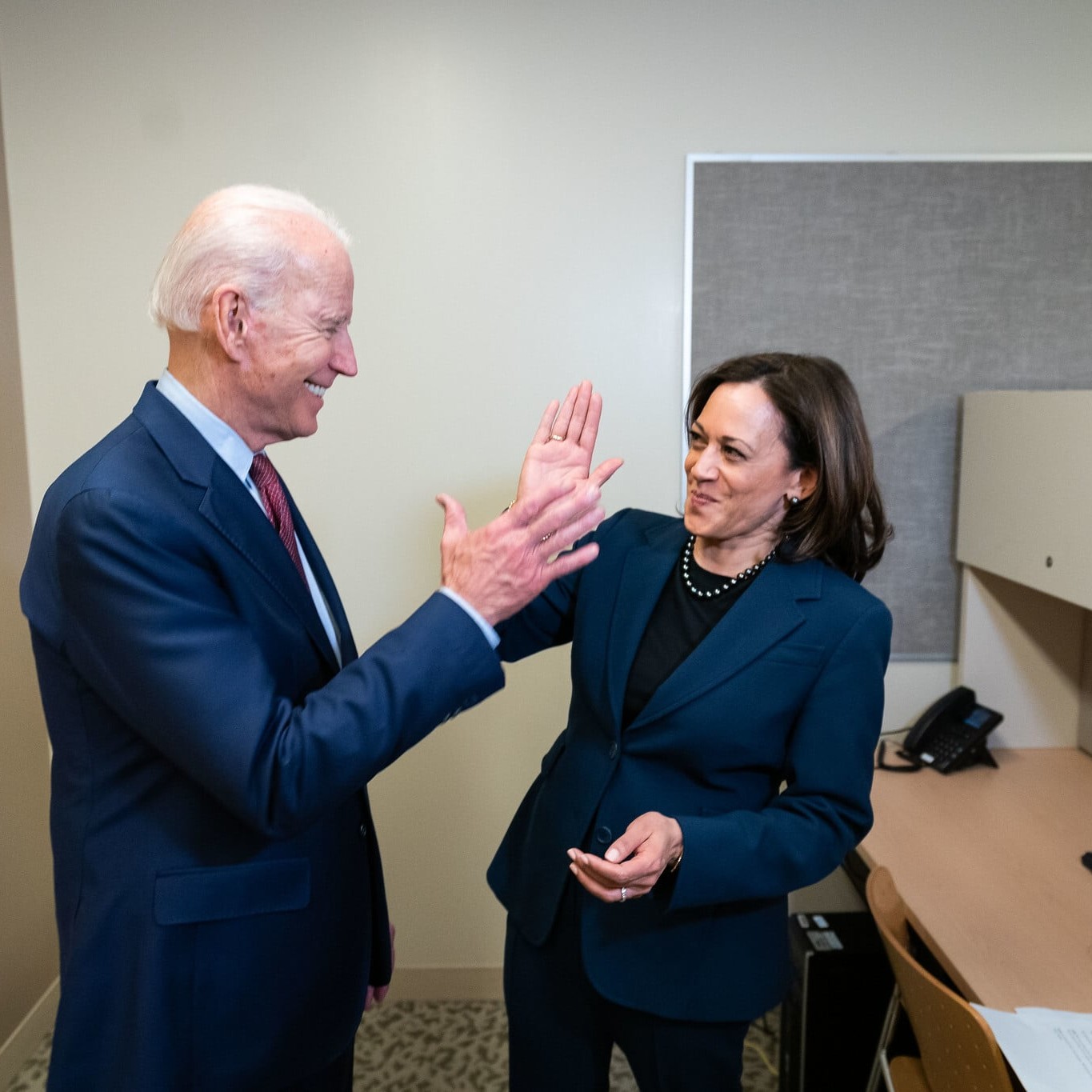Just five days after he was tapped to lead the country’s intelligence agencies, John Ratcliffe is out.
The Texas Republican lawmaker on Friday withdrew from consideration to become the next national intelligence director after several days marked by a series of unflattering media stories, muted support from GOP senators and intelligence veterans expressing concerns about his thin resume and partisan attitude about government investigators.
“Our great Republican Congressman John Ratcliffe is being treated very unfairly by the LameStream Media,” Trump wrote online, adding that he would announce his new choice to oversee the government’s intelligence agencies “shortly.”
“Rather than going through months of slander and libel, I explained to John how miserable it would be for him and his family to deal with these people,” he continued. “John has therefore decided to stay in Congress where he has done such an outstanding job representing the people of Texas, and our Country.”
The head-spinning turnaround is the latest example of a Trump administration pick going down after President Donald Trump moved to appoint a key official without first gathering the backing of senior lawmakers or conducting a thorough background examination. And it will almost certainly leave Trump with yet another acting Cabinet head once the current national intelligence director, Dan Coats, departs on Aug. 15 — a problem that has plagued the Trump administration.
Ratcliffe issued his own series of tweets minutes after Trump, writing that he was “withdrawing from consideration” and has “asked the President to nominate someone other than me” for the role.
“I was humbled and honored that the President put his trust in me to lead our nation’s intelligence operations and remain convinced that when confirmed, I would have done so with the objectivity, fairness and integrity that our intelligence agencies need and deserve,” Ratcliffe wrote.
“However, I do not wish for a national security and intelligence debate surrounding my confirmation, however untrue, to become a purely political and partisan issue. The country we all love deserves that it be treated as an American issue.”
It was a turn of events almost as sudden as when Trump originally picked Ratcliffe, a third-term Republican congressman with little name recognition or experience within the clandestine community.
Ratcliffe was previously the acting U.S. attorney for the Eastern District of Texas, but had minimal experience in the intelligence world beyond serving on the House Intelligence Committee for the last six months. Yet Trump announced Sunday on Twitter that Ratcliffe would replace Coats.
Ratcliffe garnered national attention last week when he aggressively grilled former special counsel Robert Mueller over his probe into Russian interference in the 2016 election. Many believed that Trump tapped Ratcliffe because he held similar views about FBI malfeasance during the Russia probe.
Senate Republican Party and committee leaders were lukewarm at best on his nomination.
Republican officials said Friday that the White House did not seek buy in from crucial senators and that there were few people willing to stump for Ratcliffe. Senators said they didn’t know him well and Intelligence Chairman Richard Burr (R-N.C.) gave little overt backing.
Burr told Republicans this week that Trump had called him to ask about Ratcliffe, according to a source familiar with the matter. Burr responded that he didn’t know much about the lawmaker but would consult with a few people. But less than a half hour later, Trump tweeted that Ratcliffe was his choice. A spokesperson for Burr declined to comment.
“I respect John Ratcliffe’s decision to withdraw his name from consideration for Director of National Intelligence, and I appreciate him considering serving his nation in a new role,” Burr said Friday.
A former White House official familiar with the deliberations heard today from White House and congressional officials that they didn’t believe Ratcliffe was going to make it, because of concerns over his lack of experience and questions about inflating his resume, which had been exposed in a daily drip of news articles.
Before leaving to spend the weekend at his Bedminster resort in New Jersey, Trump told reporters that he thought Republicans would have eventually come around to supporting Ratcliffe, but said the media was treating him “very unfairly.”
“The Republicans I think would have been very good,” he said. “A lot of the Republicans didn’t even know John.”
Democrats were almost instantly lined up against Radcliffe as DNI, a position that historically enjoys bipartisan support. Coats was confirmed easily at the beginning of Trump’s presidency, in part due to his tenure as a senator.
“Thank goodness,” Senate Minority Leader Chuck Schumer (D-N.Y.) said in a statement reacting to Ratcliffe’s withdrawal.
Schumer, who sent a signal to his caucus earlier this week when he announced that he would oppose Ratcliffe’s nomination, said the Texas Republican “never should have been considered in the first place.”
“This is part of a pattern from President Trump: nomination on a whim without consultation or vetting, and then forced withdrawal when mess ensues — just like what happened with Herman Cain, Stephen Moore, Ronny Jackson and many more,” he said, referring to previous failed nominees.
Trump defended the White House’s vetting process on Friday, calling it “great,” but telling reporters, “you vet for me. I like when you vet.”
He added: “We save a lot of money that way.”
A senior GOP aide expressed surprise that the White House had not set up a war room with experienced communications professionals to run a rapid response and messaging operation for such a high-profile nomination that might have been able to prepare for, and respond to, the inevitable criticism of Ratcliffe’s record.
“It kind of shows that this whole thing was slapped together from Trump watching TV,” the aide said.
The former official said the White House is now actively looking for a new candidate but doesn’t have a firm person in mind yet. Several people have already said they are not interested in the job, including Rep. Devin Nunes (R-Calif.), the ranking member on the House Intelligence Committee and a close Trump ally.
Virginia Sen. Mark Warner, the top Democrat on the Senate Intelligence panel, said Trump “should take this opportunity to nominate a DNI in the mold of Dan Coats: someone with a deep knowledge of the intelligence community, respect for the hard work intelligence professionals do to keep us safe, and the independence and integrity to speak truth to power when necessary.”
Speculation now turns to who will fill in for Coats when soon becomes the 10th Cabinet official to have left the Trump administration since 2017, which is the highest turnover rate in recent history, according to data from the Brookings Institution. By comparison, the Obama administration did not have any turnover in its Cabinet in the first two years, according to the Brookings data.
It’s unclear if his No. 2, Sue Gordon, will take over on an acting basis. Several prominent Democrats are pushing for her elevation.
“Sue Gordon is superbly qualified to serve as Acting Director of National Intelligence — and indeed, the plain language of the law requires that she be elevated to that role once Dan Coats steps down,” House Intelligence Chairman Adam Schiff (D-Calif) said in a statement. “Rather than seeking to sideline Sue Gordon, the president should recognize that she would be an excellent candidate to replace outgoing Director Coats.”
Trump on Friday said he was contemplating naming Gordon as acting director, insisting “I’ve always liked Sue Gordon.”
“That could happen,” he said. “We’ll probably be talking about it either later today or next week.”
POLITICO, Natasha Bertrand, Marianne LeVine and Burgess Everett contributed to this report.
Redazione
La redazione di Babilon è composta da giovani giornalisti, analisti e ricercatori attenti alle dinamiche mondiali. Il nostro obiettivo è rendere più comprensibile la geopolitica a tutti i tipi di lettori.
Russia-India: un partenariato resiliente
3 Apr 2025
Le relazioni tra India e Russia affondano le radici in una lunga storia di cooperazione strategica, caratterizzata da…
Romania tra estrema destra e interferenze russe
21 Mar 2025
Quarantasei anni, Victoria Stoiciu è senatrice del Partito Social Democratico rumeno. Le abbiamo chiesto un commento…
Venezuela, che fine ha fatto il cooperante italiano Trentini?
12 Mar 2025
Ne parla il libro di Paesi Edizioni Intanto a Caracas, nuovo saggio sulla crisi del Venezuela di Maurizio Stefanini:…
Se le questioni di genere dettano le agende di politica estera
19 Dic 2024
Il perseguimento di politiche identitarie da parte dell'establishment della politica estera occidentale sta portando a…




